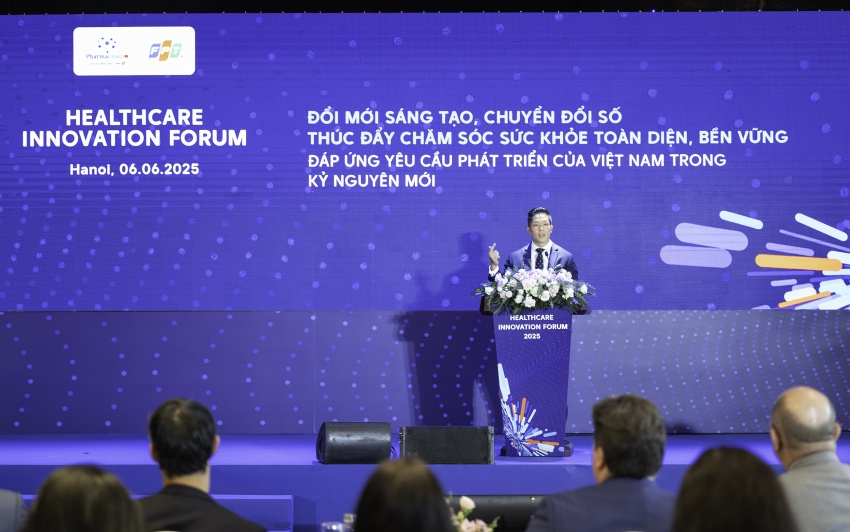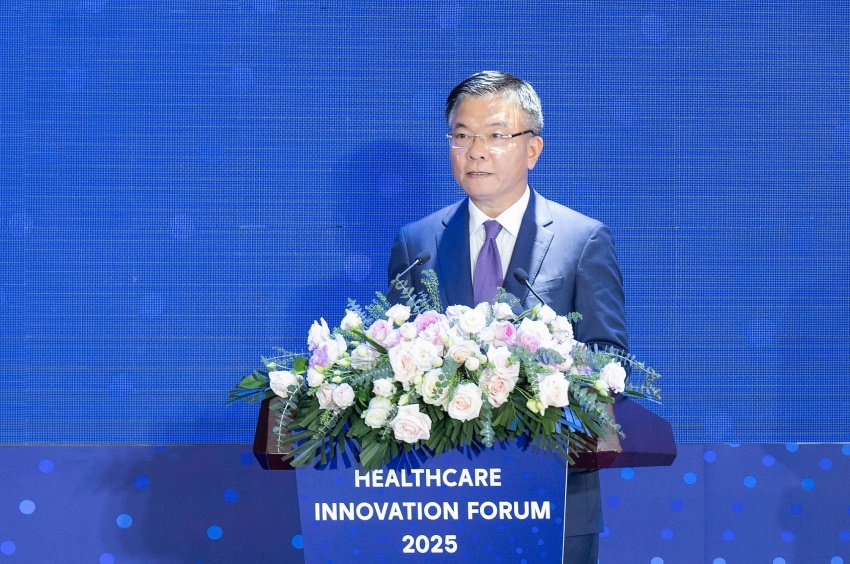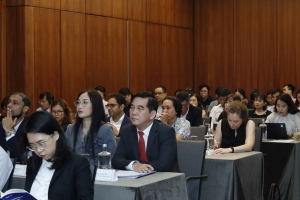INTERNATIONAL INVESTMENT
AND PORTAL
The Health Innovation Forum (HIF 2025) focused on discussing solutions to advance the development of science, technology, and innovation in priority areas of the healthcare sector; enhancing the application of AI; and accelerating digital transformation in public healthcare.
 Photo: BT
Photo: BT
According to experts, Vietnam is facing the challenge of an increasing ageing population, projected to reach 25 per cent by 2040, coupled with a high prevalence of non-communicable diseases, accounting for 77 per cent of cases. The burden of disease and disparities in healthcare access across regions diminishes quality of life and places significant strain on the healthcare system and national budget.
Consequently, the urgent priority for Vietnam is to establish a modern, efficient, and equitable healthcare and pharmaceutical ecosystem.
Darrell Oh, chairman of Pharma Group, said, "Pharma Group, as the voice of the innovative pharmaceutical industry, is fully committed to supporting Vietnam’s journey towards realising its 2045 vision. But we cannot do it alone. Only through collective efforts can we transform ambitious policies into tangible outcomes, improving public health in a lasting way. Investing in healthcare is, ultimately, investing in Vietnam’s most valuable asset – its people."
 Darrell Oh, chairman of Pharma Group. Photo: BT
Darrell Oh, chairman of Pharma Group. Photo: BT
Truong Gia Binh, head of Private Sector Development Committee, chairman of FPT Corporation said, "Vietnam has entered a new era of advancement. To realise this vision, the healthcare sector must improve in three areas; regulation, innovation, and public–private collaboration. We must shift from restrictive thinking to viewing regulation as a driver of national competitiveness, ensuring faster access to new medicines, like in the US or Japan."
"Vietnam can become a hub for AI-powered clinical trials and drug development, leveraging its strong tech talent with 1 million IT workers, with half being AI-proficient. Public–private partnerships must connect hospitals, pharmaceutical firms, and healthcare professionals through shared data platforms. Just as Vietnam rose to global prominence in software, it can now aim to lead in innovative pharmaceuticals, one of the world’s most advanced industries," he added.
As Vietnam advances towards its 2045 vision of becoming a developed, high-income nation – guided by Politburo Resolution 57-NQ/TW – the healthcare sector stands as a cornerstone for progress. By enhancing quality of life, safeguarding social welfare, and driving sustainable economic growth, healthcare is pivotal to achieving these historic national ambitions.
In his address at the event, Deputy Prime Minister Le Thanh Long noted that despite progress, Vietnam’s healthcare system struggles with uneven digital adoption, insufficient skilled personnel, and systemic gaps in preventive care, primary health services, and drug distribution networks.
 Deputy Prime Minister Le Thanh Long
Deputy Prime Minister Le Thanh Long
"The Politburo has recently issued Resolution 57 to create breakthroughs in science and technology, innovation and digital transformation. Resolution 59 on international integration in the new era, Resolution 66 on innovation in law making and enforcement, and Resolution 68 on private economic development. These are important pillars of the foundation for national development. These resolutions, together with the Politburo's resolutions in the health sector that are about to be issued, will create strong momentum and breakthroughs in people's healthcare," said DPM Long.
The themes of HIF 2025, focused on three strategic pillars, institutional frameworks, infrastructure, and human resources, to transform Vietnam's healthcare system. Discussions highlighted two critical priorities; leveraging research and development (R&D) to drive medical innovation, and building a healthcare system that is both equitable and sustainable
The themes align closely with Vietnam’s national policy directions, especially Resolution 57-NQ/TW, which promotes innovation and digital transformation. AI was highlighted as a pivotal tool and critical enabler, deeply integrated with policy objectives, to accelerate the deployment of advanced healthcare solutions and fast-track Vietnam’s journey towards its 2045 vision.
According to statistical data, 80 per cent of pharmaceutical and life sciences experts are currently utilising AI for drug discovery, while 95 per cent of pharmaceutical companies are investing in AI capabilities. AI technology is enabling pharmaceutical companies to reduce the drug discovery process from 5 to 6 years to just one year.
AI applications have the potential to generate annual value ranging from $350 billion to $410 billion for pharmaceutical companies by 2025. The use of AI in clinical trials could result in cost savings of up to 70 per cent per trial and reduce implementation time by 80 per cent.
Hoang Viet Anh, chairman of FPT Digital, believes that Generative AI can generate $60 to $110 billion in value annually for the entire global pharmaceutical value chain. AI is being used in drug discovery and development, as well as in accelerating clinical trials.
"AI is being used to design intelligent trials using simulated 'digital twins' of patients, quickening patient selection, and automation of data collection and analysis. AI could help reduce costs by up to half and reduce experiment time by 12 months," he said.
Hwee Ching Ang, PhD, deputy CEO, Experimental Drug Development Centre, Singapore said, "Asia-Pacific’s growing healthcare need is driving interest and investment into innovation. The Singapore government has made a commitment to biomedical innovation over the past 20 years to build a wealth of discovery and attract a strong talent pool."
From 2000 to 2018, the Singapore government invested close to $11 billion in biomedical R&D. This enabled Singapore to engage global talents and develop local talents, five times more biomedical researchers per person than the US in 2018.
According to Ang, the reasons there companies were choosing Singapore as regional headquarters were; proximity and ease of access to neighbouring markets; favourable business environment with a strong legal/regulatory framework, stable political climate; access to regional talent pool; and similar business culture to global headquarters.
 Global pharma expects bumper year
Global pharma expects bumper year
Increasing footprints in Vietnam in 2023, multinational corporations continue to eye stronger local partnerships to bring more new innovative medicines and vaccines to the local market in 2024 and beyond.
 Pharma Group expects new pharmaceutical law to open up potential
Pharma Group expects new pharmaceutical law to open up potential
Appreciative of the potential of Vietnam's pharma sector Darrell Oh, Pharma Group chairman, spoke with VIR's Nguyen Huong about some of the outstanding development and innovation in the industry.
 New report charts path for Vietnam’s clinical trial growth
New report charts path for Vietnam’s clinical trial growth
Pharma Group, in collaboration with KPMG and Oxford University Clinical Research Unit (OUCRU), released the ‘Roadmap to the Future of Clinical Trials in Vietnam’ report on May 20 in Ho Chi Minh City.



















